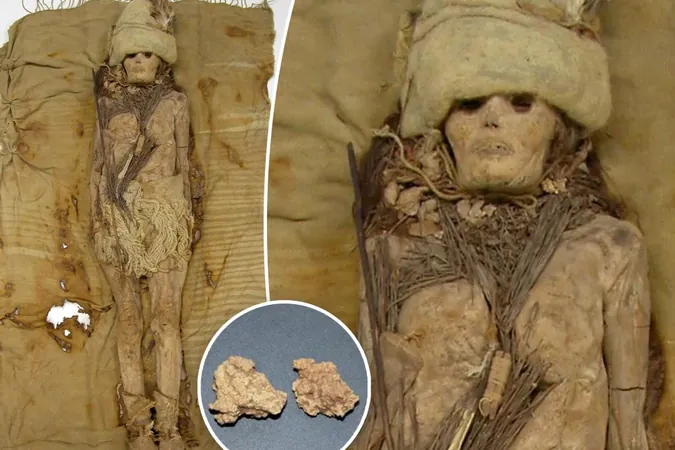
Shocking Discovery: World's Oldest Cheese DNA Found on Mummies!
2024-09-25
Author: Jia
Shocking Discovery: World's Oldest Cheese DNA Found on Mummies!
In a groundbreaking revelation, scientists have unearthed what is believed to be the world's oldest cheese, dating back an astonishing 3,600 years! This extraordinary find came from Bronze Age mummies in a graveyard located in northwest China's Tarim Basin, specifically from a cemetery of the Xiaohe people, dating back to around 2000 B.C.
The cheese in question? Kefir cheese, which is often regarded today as a health-conscious cream cheese alternative. Intriguingly, this dairy delight was discovered smeared or “scattered” around the heads and necks of the preserved corpses in the area. While this white-colored substance was observed for the first time over two decades ago, it has only recently been identified as cheese thanks to rigorous research published in the esteemed journal Cell.
Lead researcher Qiaomei Fu explained the importance of this discovery: “Food items like cheese are extremely difficult to preserve over thousands of years, making this a rare and valuable opportunity. Studying the ancient cheese in great detail can help us better understand our ancestors’ diet and culture.”
The research involved extracting mitochondrial DNA from three different tombs. The analysis revealed that the cheese contained DNA from both cow and goat. Distinctive from cheese-making practices in Greece and the Middle East, the Xiaohe culture uniquely separated different types of animal milk into batches for cheese production, shedding light on their culinary preferences.
Furthermore, the presence of fungal bacteria consistent with modern-day kefir grains was detected, providing a lineage trace of the cheese. Astonishingly, the current cheese-making strain of Lactobacillus bacteria appears to have originated from both China and Russia, contradicting previous beliefs that tied its origins solely to Russia's Caucasus Mountains.
This study not only highlights a significant step in understanding ancient food cultures but also suggests that these bacteria may have played a pivotal role in stabilizing genetics and enhancing milk fermentation over the centuries. Fu emphasizes the implications of this research: “This is an unprecedented study, allowing us to observe how a bacterium evolved over the past 3,000 years. Moreover, by examining dairy products, we’ve gained a clearer picture of ancient human life and their interactions with the world.”
With such incredible advancements in DNA technology, scientists remain hopeful about delving deeper into other mysteries from our past, suggesting we may soon uncover even more lost treasures from antiquity. Stay tuned, as this discovery could just be the tip of the iceberg in revealing the rich tapestry of our ancient culinary heritage!



 Brasil (PT)
Brasil (PT)
 Canada (EN)
Canada (EN)
 Chile (ES)
Chile (ES)
 España (ES)
España (ES)
 France (FR)
France (FR)
 Hong Kong (EN)
Hong Kong (EN)
 Italia (IT)
Italia (IT)
 日本 (JA)
日本 (JA)
 Magyarország (HU)
Magyarország (HU)
 Norge (NO)
Norge (NO)
 Polska (PL)
Polska (PL)
 Schweiz (DE)
Schweiz (DE)
 Singapore (EN)
Singapore (EN)
 Sverige (SV)
Sverige (SV)
 Suomi (FI)
Suomi (FI)
 Türkiye (TR)
Türkiye (TR)